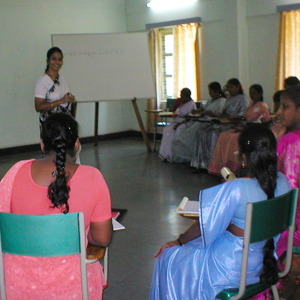Gender Training
A brief understanding
IWID considers Gender training as one of the most important tools to build gender perspective among NGO workers, policy makers and planners. It gives them space and strengthen, capacities to rethink old assumptions and practices in order to achieve greater gender -justice in the process of policy formulation and implementation. The aim of gender training is to consciously introduce gender as a category of analysis to bring into focus gender bias that underpins ideas and actions of individuals and institutions alike
| Methodology Adopted | Facets of training | Specifications |
| The process oriented participatory methodology of the training helps the participants to explore their attitudes towards and beliefs about gender, to critically lookat sex stereotypes and also to challenge each one of us to review and reflect on the gender-blind-spots of our own lives. |
|
|
Capacity Building

IWID sees training as a powerful tool for change. Training develops a feminist consciousness that challenges patriarchal values, institutions and gender roles. It aims at Enhancing the self-esteem of women, Increasing the conceptual understanding, analytical skills, awareness and sensitivity to issues relating to class, caste and gender in order to bring about a women-centered shift in socio-economic and political dynamics. , and strengthening their leadership capacities.Training also enhances the planning and monitoring, evaluating and documentation skills.
